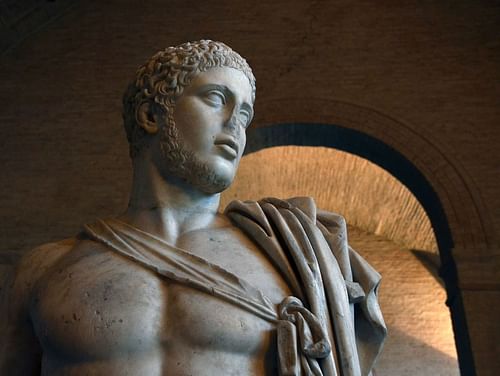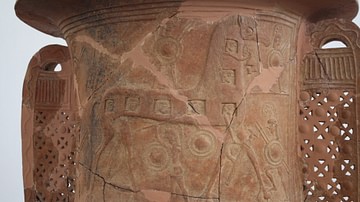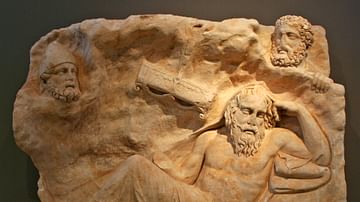
Diomedes is the king of Argos and a hero in Greek mythology. He was one of the leading warriors in the Trojan War, with the reputation of being gifted and strong in combat. He contributed 80 ships to the Greek forces in the Trojan War and was in the famous Trojan Horse on the night that Troy was destroyed.
During the Trojan War, he was often sent off with his friend Odysseus, the king of Ithaca, to go on various missions. He was trusted by King Agamemnon of Mycenae, which was no easy feat, and was beloved by Athena, the Greek goddess of wisdom and war. Like other Trojan War heroes, Diomedes' story is told most famously in the Iliad by Homer (c. 750 BCE).
Early Life
Diomedes was born to Tydeus, an Aetolian hero and Deipyle, daughter of King Adrastus of Argos, the leader of the Seven Against Thebes. Diomedes' grandfather and father were part of the expedition against Thebes, with Tydeus losing his life during the campaign. With his father killed, Diomedes became one of the Epigoni, a group of sons who marched off to Thebes to avenge their father's deaths. After Diomedes' uncle was also killed at Thebes, his grandfather Adrastus died from a broken heart, leaving the throne of Argos to Diomedes. Diomedes married his cousin Aegialia to strengthen his ties to the crown.
After his success in Thebes, Diomedes travelled to Calydon (Aetolia) with Alcmaeon, the leader of the Epigoni, to restore the rule of Oeneus (his grandfather). Oeneus had been overthrown by his nephews – the sons of his brother Agrius. Diomedes drove out Agrius and his sons, killing many of them in the process, except for Onchestos and Thersites, who had fled (Thersites would later fight in the Trojan War alongside Diomedes). Oeneus was able to take back his rightful place on the throne. In some traditions, Diomedes travelled to Aetolia and restored Oeneus to his throne after the Trojan War.
According to Pseudo-Apollodorus, Diomedes was one of Helen's suitors and was therefore bound by the oath that all suitors swore to Helen's father, Tyndareus. The oath stated that all the suitors would protect Helen's husband and their marriage. Therefore, Diomedes eagerly answered Agamemnon's call for war against the Trojans after Paris of Troy had taken Helen.
Diomedes in the Iliad
Diomedes contributed 80 ships from Argos, Asine, Epidaurus, Troezen, Tiryns, and Aegina to the Greek forces. He was accompanied by his friends Sthenelus, son of Capaneus, and Euryalus the Argonaut, son of Mecisteus. Athena had a special place in her heart for Diomedes and Odysseus and watched over them throughout the war. Diomedes wore a cuirass that had been made by Hephaistos, the Greek god of fire.
In Book V of the Iliad, Diomedes is given strength and daring by Athena:
She set the man ablaze, his shield and helmet flaming
with tireless fire like the star that flames at harvest,
bathed in the Ocean, rising up to outshine all other stars.(Iliad, 5.4-6)
Protected by Athena, Diomedes made his way to the middle of the battle. Ares, the Greek god of war, who supported the Trojans, moved to help the Trojan army but was stopped by Athena. Diomedes fought his way through the Trojan ranks. Pandarus, a Trojan lord skilled with a bow and arrow, took his shot and hit Diomedes in his right shoulder. Diomedes called for his friend Sthenelus to pull the arrow out of his shoulder and prayed to Athena:
Hear me, daughter of Zeus whose shield is thunder,
tireless one, Athena! If you ever stood by my father
with all your love amidst the blaze of battle,
stand by me - do me a favour now, Athena.
Bring that man into range, and let me spear him!(Iliad, 5.126-130)
Athena heard his prayer and gave him the strength of his father, Tydeus. She also blessed him with the ability to see the immortals on the battlefield, warning him to stay away from them, except for Aphrodite, the Greek goddess of love and beauty. Diomedes killed one Trojan after another, including Echemmon and Chromius, sons of King Priam of Troy, fighting with the strength and might of a god. Aeneas, a prince of Troy and the son of Aphrodite, challenged Pandarus to pick up his bow and arrow and fight Diomedes again. Diomedes faced them both without flinching, killed Pandarus and almost finished off Aeneas before Aphrodite rescued him.
Diomedes turned his attention to Aphrodite and managed to thrust his spear into her wrist before he attempted to kill Aeneas once again. This time Apollo defended Aeneas and warned Diomedes not to mess with the gods as they were in a different league to mortals. Athena joined Diomedes on the battlefield, and together they faced Ares. With Athena's help, Diomedes' bronze spear struck Ares in his bowels, and Ares fled to Olympus to seek Zeus' compassion (which he did not get).
In Book VI of the Iliad, Diomedes came face-to-face with Glaucus, a Lycian Prince and ally of Troy. They discovered that their families had a history of friendship and exchanged armour as a sign of goodwill. Diomedes got the better deal, which he was very well aware of, as Glaucus' armour was made of gold, while Diomedes' was made from bronze. Diomedes was one of nine Greeks who volunteered to fight in a one-on-one battle against Hector, Prince of Troy, who was considered a famous warrior, much like Achilles. Ajax the Great, prince of Salamis, was chosen to face Hector.
Diomedes' bravery is best portrayed in Book VIII of the Iliad when he rescues Nestor, king of Pylos after one of his horses is wounded by Prince Paris. He called his faithful friends Sthenelus and Eurymedon to help him, and they charged toward Hector and managed to kill his chariot driver. Before they could kill Hector, he is swiftly saved by Zeus. Hector hurled insults at Diomedes as they retreated, and Diomedes believed that the Trojans would think him a coward for fleeing. Seeing how discouraged the Greeks were, Zeus sent out an eagle as an omen which revitalised them and encouraged them to continue fighting. Once again, Diomedes led his men into battle and killed Agelaus, a Trojan captain.
In Book IX of the Iliad, Agamemnon was dismayed that Zeus had seemed to have taken the side of the Trojans and suggested that it was time to return home. The Greeks were shocked by his negative attitude. Diomedes gave a rousing speech that lifted their spirits and reminded them why they came to Troy in the first place. Agamemnon and Menelaus enlisted Diomedes' help to spy on the Trojans at night. Diomedes chose Odysseus to go with him. Once near the Trojan camp, they met Dolon, son of the sacred Trojan herald, Eumedes, who was on his way to spy on the Greeks. They captured him, learnt valuable information before killing him, and decided their best course of action would be to attack the newly arrived Thracians. They killed King Rhesus and twelve of his men and stole his horses to take back to the Greek camp (fulfilling a prophecy that the Greeks would be victorious if King Rhesus' horses were taken).

After being wounded by Paris, Diomedes still gave wise counsel and won all the games he entered in Patroclus' funeral games, showing his strength and unstoppable nature.
Clash with Achilles
Diomedes and Achilles had a dispute over Diomedes' cousin Thersites. Achilles had killed Penthesilea, Queen of the Amazons and a Trojan ally. Upon seeing how beautiful she was, he instantly fell in love and regretted killing her. Thersites laughed at Achilles and made fun of him for falling in love with somebody who was dead. So Achilles killed him for mocking his grief. Diomedes naturally wanted to avenge his cousin but was stopped by the other Greeks. Achilles sailed to Lesbos to purify himself after killing a Greek noble.
Prophecies
Outside of the Iliad, Diomedes was involved in fulfilling a few other prophecies. The first one concerned that of Philoctetes, prince of Meliboea, who had been left on the island of Lemnos after his foot was horribly injured. The seer Calchas, priest of Apollo, had prophesied that the war could only be won with the help of Hercules' bow and arrows. Philoctetes was in possession of this famed bow, so Diomedes and Odysseus travelled to Lemnos to fetch him and promised that he would finally be healed by Podalirius, chief healer of the Greeks at Troy if he returned with them.
Another prophecy involved Achilles' son Neoptolemus. Calchas again foretold that the only chance for the Greeks to be victorious was for Neoptolemus to be present at Troy. So Diomedes and Odysseus travelled to Skyros and brought him back to Troy.
The Palladium
The Palladium was Athena's sacred image or icon, kept safe in Troy's citadel. The captive seer Helenus had told the Greeks that stealing the Palladium was their best chance at winning the Trojan War. So Diomedes and Odysseus disguised themselves as beggars and snuck into Troy, successfully stealing the Palladium. As they returned to the Greek camp, Odysseus tried to kill Diomedes, and they decided that the Palladium was cursed.
The fate of the Palladium differs depending on the source. According to Plutarch (c. 45/50 to c. 120/125 CE), in his Quaestiones Graecae, Diomedes carried the Palladium with him back to Argos. On the other hand, Pausanias (c. 115 to c. 180 CE) states that Diomedes was robbed of the Palladium in Attica. In contrast, other writers mention that Diomedes gave the Palladium back to the Trojans to avoid bad luck and suffering.
After the Trojan War
Diomedes was one of the Greeks who had a spot in the famous Trojan Horse along with Odysseus, Menelaus and Neoptolemus. After Troy had been sacked and the Trojan War had ended, Diomedes left Troy with Nestor and Menelaus and reached Argos safely with the help of Athena. However, in his absence, his wife Aegialia had been unfaithful to him (said to be a punishment from Aphrodite after Diomedes had wounded her in Troy). As a result, Diomedes had either willingly left Argos or been run out.
Other writers state that Diomedes was thrown off course by a storm on his way home and ended up on the coast of Daunia (modern-day Apulia) in Italy, where he was given a warm welcome from King Daunus. While in Daunia, Diomedes helped them win a war against the Messapians and was given land and Euippe (King Daunus' daughter) as a reward. He and Euippe had two sons together, and he was said to have given up all hatred towards the Trojans. Diomedes died of old age in Daunia.
According to the Byzantine poet John Tzetzes (c. 1110 to c. 1180 CE), Diomedes was murdered by King Daunus, and his body was returned to Argos.
Worship & Legacy
Diomedes was worshipped in Italy, where statues of him existed in Argyrippa, Metapontum, and Thurii. In ancient Greece, a painting of him carrying the Palladium could be found on the Acropolis of Athens. He was also painted in Delphi. Athena was said to have granted him immortality, and his armour was preserved in a temple of Athena at Luceria in Apulia, Italy.
Diomedes founded several cities in Italy, including Beneventum, Venusia (Venosa), Salapia, and Brundusium (Brindisi). The phrase "Diomedes Choice" or a "Diomedean Necessity" is used when somebody reluctantly does something for the greater good. It is named in honour of Diomedes' actions during the Trojan War.
Diomedes is one of the most famous warriors in the Trojan War, known for being strong, brave and wise. Although he was one of the youngest Greek kings in Troy, there were many times when he gave wise counsel to his elders like Agamemnon, and he proved himself capable in battle time and time again. He also has the distinction of being one of the few warriors who were able to injure the gods during the Trojan War.










